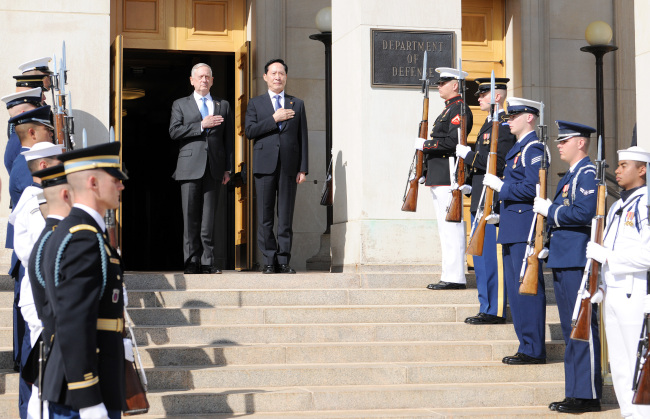Allies: Military option can back diplomacy with N. Korea
By YonhapPublished : Aug. 31, 2017 - 09:36
The defense chiefs of South Korea and the United States agreed to support diplomatic efforts to resolve the North Korea issue by readying "strong, effective and reliable" military options.
In their talks at the Pentagon on Wednesday (local time), South Korean Defense Minister Song Young-moo and US Defense Secretary Jim Mattis reaffirmed that the alliance remains robust in the face of the North's brinkmanship.
"Attention is being focused on the South Korea-US alliance due to North Korea's nuclear and missile programs," Song said at the outset of the talks. "I believe such problems will be resolved wisely on the basis of the alliance."
It was the minister's first meeting with Mattis since he took office in July.
In their talks at the Pentagon on Wednesday (local time), South Korean Defense Minister Song Young-moo and US Defense Secretary Jim Mattis reaffirmed that the alliance remains robust in the face of the North's brinkmanship.
"Attention is being focused on the South Korea-US alliance due to North Korea's nuclear and missile programs," Song said at the outset of the talks. "I believe such problems will be resolved wisely on the basis of the alliance."
It was the minister's first meeting with Mattis since he took office in July.

It came two days after the North sharply escalated tensions in Northeast Asia by flying a ballistic missile over Japan.
"Here in Washington we are keenly aware that South Korea is on the frontline and we cannot be complacent," Mattis said. "In the interest of keeping our alliance fit for these times, we must continue to deepen our military relationship, building on the high level of trust that exists between our two nations."
The defense chiefs of the allies expressed support for "ongoing diplomatic efforts" for the denuclearization of the North, according to a summary of the results of their talks.
They "emphasized that simultaneously, strong, effective and reliable military options will enhance diplomatic efforts," read the statement issued by Song's ministry.
Song and Mattis also agreed to accelerate a push for the "conditions-based" transfer of wartime operational control of South Korean troops from Washington to Seoul.
They plan to discuss relevant details when they meet in Seoul in October for the annual Security Consultative Meeting.
They agreed to further move forward consultations on revising a bilateral missile guideline signed in 2012, added the ministry.
The Moon Jae-in administration wants to double the maximum weight of South Korea's ballistic missile payloads to 1 ton to help counter the North's growing threats.
The minister hinted at some progress in the discussions.

"We saw eye to eye on the need to make the weight of the payload suitable for the target," Song told reporters after the meeting.
Song and Mattis also talked about the deployment of the US THAAD missile defense system to South Korea, according to a senior government official with knowledge of the discussions. Four THAAD rocket launchers have yet to be installed at the US base in Seongju, some 300 km southeast of Seoul, amid fierce opposition from local residents.
Song raised the issue of the possible redeployment of US tactical nuclear weapons to the Korean Peninsula, he added, speaking on the condition of anonymity. The US withdrew those weapons in the early 1990s.
Also discussed was South Korea's possible pursuit of building nuclear-powered submarines to counter North Korea's submarine-launched ballistic missile threats.
But during a parliamentary session, Vice Defense Minister Suh Choo-suk explained that during the Song-Mattis talks, the two sides did not delve deep into the issues concerning the tactical nukes and nuclear-powered submarines, though the issues were briefly mentioned.
Later in the day, Song met with White House National Security Adviser H.R. McMaster, and the two sides agreed to the importance of peaceful solutions to the North Korean problem.
They also shared the need to use diplomatic and economic pressure as a priority to compel Pyongyang to come forward for dialogue, the ministry said.
"(McMaster) emphasized that the US would coordinate closely with the South Korean government on all measures related to the North Korean issue and make joint decisions as an alliance," it said in a separate press release. (Yonhap)











![[Today’s K-pop] BTS pop-up event to come to Seoul](http://res.heraldm.com/phpwas/restmb_idxmake.php?idx=644&simg=/content/image/2024/04/17/20240417050734_0.jpg&u=)





![[KH Explains] Hyundai's full hybrid edge to pay off amid slow transition to pure EVs](http://res.heraldm.com/phpwas/restmb_idxmake.php?idx=652&simg=/content/image/2024/04/18/20240418050645_0.jpg&u=20240419100350)

![[Today’s K-pop] Zico drops snippet of collaboration with Jennie](http://res.heraldm.com/phpwas/restmb_idxmake.php?idx=642&simg=/content/image/2024/04/18/20240418050702_0.jpg&u=)